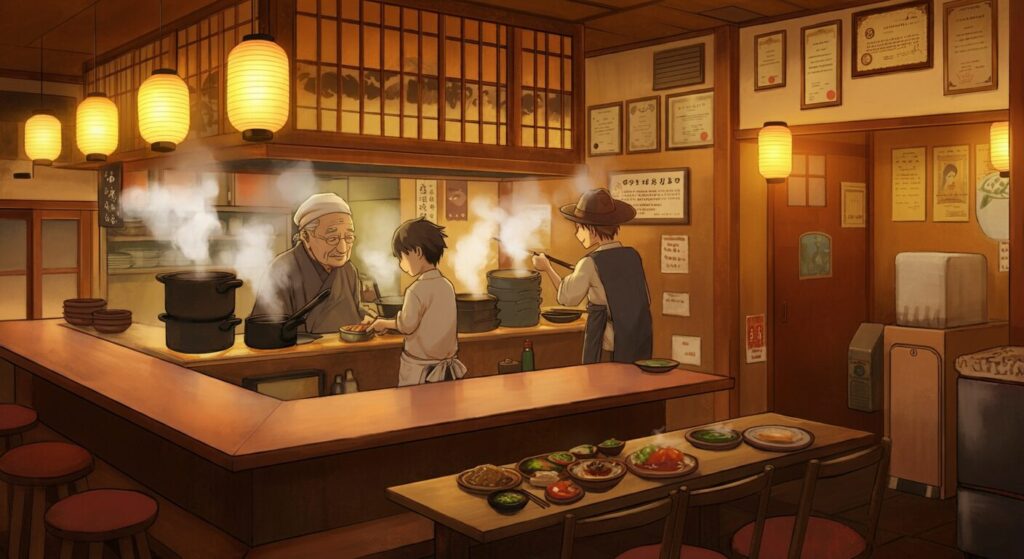2024-11-28 Story Dice: Travel Adventures!
Meeting People Story
Story Dice Used
- Light bulb → overhead light in shop
- Hand → handshake
- Question mark → language confusion
- Footprints → walking together
- Globe → international restaurant
Synopsis
“Under the flickering light×「flickering light」は「ちらちらする光、明滅する光」という意味です。
文法説明:
「flicker」は「ちらつく」という動詞で、現在分詞「flickering」が「light」を修飾する形容詞として使われています。
例文:
The candle's flickering light cast shadows on the wall.
ろうそくのちらつく光が壁に影を投げかけていました。 (light bulb) of a small shop, I tried to buy some water. The shopkeeper reached out his hand×「reach out one's hand」は「手を差し出す」という意味の慣用句です。
文法説明:
- 「reach out」(手を伸ばす)という句動詞に「hand」(手)を加えた表現
- 友好や援助の意思を示す際によく使われます
例文:
He reached out his hand to help me up.
彼は私を助け起こそうと手を差し出しました。 (hand), but we couldn’t understand each other (question mark). He walked with me (footprints) to his family’s international restaurant (globe) nearby. Now I eat there every week and am learning to cook Japanese food!”

The story: “The Language Mix-Up” (170 words)
It was my third week in Japan, and I still hadn’t mastered the basics×「master the basics」は「基本を習得する、基礎を完全に理解する」という意味の表現です。
文法説明:
「master」は「完全に習得する」という意味の動詞で、完璧な理解や技能の獲得を表します。現在完了形(hadn't mastered)で使われ、その時点までの経験を示しています。
例文:
She has mastered the basics of cooking.
彼女は料理の基本を習得しました。 of shopping. That evening, I just wanted to buy water. I found a small shop with a traditional sliding door×「traditional sliding door」は「伝統的な引き戸」という意味です。
文法説明:
「sliding」は「slide」(滑る)の現在分詞が形容詞として「door」を修飾しています。「traditional」がさらにその全体を修飾する重要形容詞の並列です。
例文:
The temple has beautiful traditional sliding doors.
その寺には美しい伝統的な引き戸があります。. The shopkeeper smiled and reached out his hand×「reach out one's hand」は「手を差し出す」という意味の慣用句です。
文法説明:
- 「reach out」(手を伸ばす)という句動詞に「hand」を加えた表現
- 援助や友好の意思を示す時によく使われます
例文:
She reached out her hand to greet me.
彼女は私に挨拶をするために手を差し出しました。, making a gesture×「make a gesture」は「ジェスチャーをする、身振りをする」という意味です。
文法説明:
「make」+「名詞」の形で「〜をする」という意味を作る表現の一つです。現在分詞「making」で進行中の動作を表しています。
例文:
He made a gesture to show he understood.
彼は理解したことを示すためにジェスチャーをしました。 I didn’t understand. He spoke rapidly in Japanese, and I stood there, practically×「practically」は「事実上、ほとんど、実質的に」という意味の副詞です。
文法説明:
- 誇張表現で「ほぼ」「ほとんど」という意味を表します
- 比喩的な表現を強調する時によく使われます
例文:
The room was practically empty.
その部屋はほとんど空っぽでした。 lost in the conversation.
He brought his son, who turned out to be×「turn out to be」は「結果として〜であることがわかる」という意味の慣用句です。
文法説明:
- 予想していなかったことや、後で分かった事実を述べる時に使います
- 過去形では「turned out to be」となります
例文:
What I thought was difficult turned out to be easy.
難しいと思っていたことが、実は簡単だとわかりました。 the owner of a fusion restaurant×「fusion restaurant」は「フュージョンレストラン、折衷料理のレストラン」という意味です。
文法説明:
「fusion」(融合)が形容詞として「restaurant」を修飾し、複数の料理様式を組み合わせた店であることを表します。
例文:
The fusion restaurant serves Japanese-Italian dishes.
そのフュージョンレストランは和伊折衷料理を出します。 next door. “My father wanted you to try our special dinner,” the son explained in English. “He says you remind him of me×「remind someone of」は「〜に(人・物)のことを思い出させる」という意味です。
文法説明:
- 「remind」は「思い出させる」という意味の動詞
- 「remind + 人 + of + 思い出すもの」という形を取ります
例文:
Your smile reminds me of my mother.
あなたの笑顔は私に母のことを思い出させます。 when I was learning foreign languages.”
That evening, they served me amazing fusion dish×「fusion dish」は「フュージョン料理、折衷料理」という意味です。
文法説明:
「fusion」(融合)が形容詞として「dish」(料理)を修飾し、複数の料理様式を組み合わせた一品を表します。
例文:
The chef created a unique fusion dish combining Italian and Japanese flavors.
シェフは和伊折衷の独特な融合料理を作りました。 – Japanese curry with Mediterranean spices. When I tried to pay, they refused×「refuse」は「断る、拒否する」という意味の動詞です。
文法説明:
- 「to + 動詞」の形と共に使われることが多いです
- 過去形は「refused」となります
例文:
He refused to accept the money.
彼はお金を受け取るのを断りました。. Instead, they gave me a bottle of water and invited me to return.
Since then, I’ve become a regular at×「become a regular at」は「(お店などの)常連になる」という意味の表現です。
文法説明:
- 現在完了形「have/has become」で、過去から現在までの変化を表します
- 「regular」は「常連客」という意味の名詞
- 場所を示す前置詞「at」が必要です
例文:
She has become a regular at the local café.
彼女は地元のカフェの常連になりました。 their restaurant. Every Tuesday, I learn Japanese while watching them cook. What started as a confused attempt×「a confused attempt」は「困惑した試み、混乱した attempt」という意味です。
文法説明:
- 「confused」(困惑した)が形容詞として「attempt」(試み)を修飾
- 不定冠詞「a」は単数の数えられる名詞につきます
例文:
His first speech was a confused attempt to explain the situation.
彼の最初のスピーチは状況を説明しようとする混乱した試みでした。 to buy water has become a weekly tradition×「a weekly tradition」は「週に一度の習慣、毎週の伝統」という意味です。
文法説明:
- 「weekly」(毎週の)が形容詞として「tradition」を修飾
- 規則的に繰り返される習慣や伝統を表します
例文:
Sunday dinner has become a weekly tradition in our family.
日曜日の夕食は私たちの家族の週例の伝統となりました。.








A Little Boy’s Travel Adventure
Theme: During Transit
5 dice: 1. Ropeway, 2.Bud, Sprout, 3.Feather, 4.Hand, 5.Quote Bubble
A little boy (‘little boy’ = ‘sprout’) started for his first travel abroad to Switzerland by himself.
The original plan was to fly (‘fly’ = ‘feather’) from Japan to Switzerland, and then change to local transportation such as mountain trains.
But the airplane (‘airplane’ = ‘feather’) got delayed, and he could not catch the trains. He felt he was in trouble and asked someone nearby for help (‘ask for help’ = ‘hand’).
Then a kind person gave him a good advice (‘a kind person’s advice’ = ‘quote bubble’) to use other train lines and ropeway (‘ropeway’ = ‘ropeway’) to get to the top of the Matterhorn.
On the way to the top of the mountain, he could see beautiful scenery of mountains and glacier, and many kind of mountain plants sprout out (‘mountain plants sprout out’ = ‘sprout’).
At the top of mountain, he cried, ”I did it!” (”I did it!” = ‘quote bubble’)
He finally achieved his hope and felt satisfied and happy. Then, his first trip to abroad ended successfully.
135 words excluding annotations